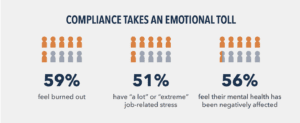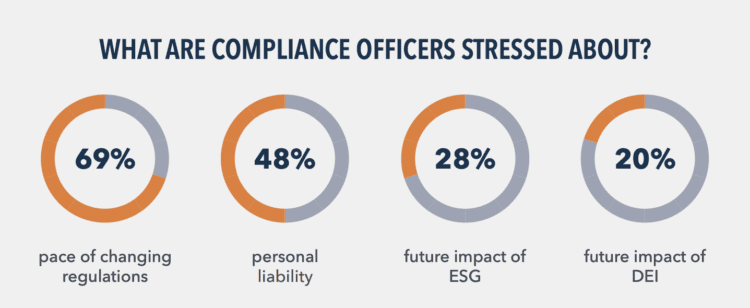No one has surveyed the mental health and working conditions of compliance officers for 10 years. We decided that was long enough. The findings of a survey we conducted last year, discussed below, suggest that many COs work in a high-stakes environment where their progress is hard to measure, let alone recognize.
When your job is to ensure a corporation avoids employing child or forced labor, the stakes are going to be high. If you defend your business against corruption, committing fraud, or engaging in medical malpractice on a wide scale, the stakes are so high that, if you fail, in many cases, international media outlets will cover the story. Your name might get mentioned. Failure will result in a measurable hit to your company’s stock and valuation. The reputational damage will be harder to quantify. If a crime is committed, prosecutors may target individuals in leadership with fines or jail time. They may even come after you.
Welcome to compliance.
We spent the past months digging into the working conditions and lived experiences of compliance officers. In August and September of 2021, we carried out a research study to examine the relationship between work in the compliance field and stress and mental health issues. An independent research analyst participated in the project and in the design for the survey, which was completed by 240 compliance officers. The most recent survey of compliance workplace stress we identified was conducted in 2012 by the Society for Corporate Compliance and Ethics (SCCE).
https://twitter.com/malcky/status/979437283593064448
Though we already knew compliance is considered a stressful field, we were surprised to discover the level of burnout and mental health issues compliance officers live with. (Download the survey report now) Some of that stress derives from factors that professionals in other lines of work experience. But there is also a unique quality to compliance. While others enjoy a significant margin of error in their work, many compliance officers say they feel they have no room or permission for failure.

“There is an immense pressure to deliver,” wrote one CO in an open response section of the survey. “Other departments have permission to fail. I can’t get anything wrong.”
Despite this occupational hazard, most compliance officers love their jobs.
In fact, many COs say their job has had a negative effect on their mental health, but they are still satisfied with it. According to our recent survey, six in 10 compliance officers say they experience burnout at work. More than four in 10 deal with anxiety in some form on the job. Roughly one quarter (24 percent) experience depression symptoms. But six in 10 are satisfied or very satisfied with their career. Seven in 10 are satisfied or very satisfied with life.
Our findings point to the fact that guardian roles like compliance tend to be difficult and exacting, but also highly rewarding. More on this later.
Download Survey Results: Compliance Officer Working Conditions, Stress & Mental Health 2022
“You don’t read about most organizations every day — because they’re not getting in trouble.”
We asked Colleen Golden, director of quality improvements and compliance at Mental Health Partnerships, to comment on the results and help us unpack the “no permission to fail” statement and others like it we received in response to the open-ended question, “What is the greatest source of stress you experience because of your job?”
“You see other departments getting praised for meeting 60 or 70 percent of their goals,” Golden said. “Then compliance is over here meeting 98 percent. And I wake up in the middle of the night, worrying, ‘Oh, man, why didn’t I get that other two percent?’”
In what’s undoubtedly a nod to the 2015 Yates Memo, just under half of respondents (48 percent) say the threat of personal liability is a significant source of the stress they experience. It should be noted, however, that compliance officers literally do have some permission to make mistakes from a regulatory standpoint. In its 2020 updated Evaluation of Corporate Compliance Programs guidance, DOJ states, “Prosecutors may credit the quality and effectiveness of a risk-based compliance program that devotes appropriate attention and resources to high-risk transactions, even if it fails to prevent an infraction.”
Still, regulatory guidance does not directly translate into corporate culture. And the anecdotal evidence unearthed by our report speaks to something that isn’t easy to quantify. We live in the Moneyball era of performance tracking and analysis. Some positions allow for, or even invite, measurement and key performance indicators. If leaders can measure a worker’s or a department’s progress, they can also reward them.
But compliance eludes measurement. Teams are successful, in a sense, only when their hard work goes unseen.
“You don’t read about most organizations every day, because they’re not getting in trouble,” said Gerry Zack, CEO of the Society for Corporate Compliance and Ethics (SCCE). “It’s impossible to say how many violations the profession prevented. And that is a difficult part of the job. But still, companies that have implemented strong compliance programs, they tend to be ones that you’re not reading about very much.”
Our survey suggests that this dynamic follows a Newtonian logic: stress cannot be created or destroyed, it can only be transferred. Compliance officers are asked to personally absorb the pressure of ensuring their businesses do not perpetuate corruption, fund terrorism, expose users or employees to cyber threats, profit from child or forced labor, and any number of other crimes that thrive in American and international markets.
“It’s ironic that in a job focused on human failure, it’s not considered okay to fail,” Zack said. “But I think people are being too hard on themselves. Failure is inevitable, especially in a large organization. There is always someone doing something somewhere. Even the government recognizes that an effective compliance program can have failures. But, until we start recognizing the saves – the scandals prevented – as much as the misses, it’s always going to be a challenge.”
The Mental Health Snapshot
The vast majority of our respondents reported experiencing symptoms of anxiety and depression to some degree. And in most cases, office dynamics appear to be the primary culprit. Among those respondents who had experienced anxiety at work in the past year, 64 percent say their job played a large or extremely large role. Among those who experienced depression, 54 percent say their job is the source.
 Compliance officers, nevertheless, tend to lead satisfied lives. Six in 10 respondents say they are satisfied or very satisfied with their job. Nearly three quarters (73 percent) are satisfied or very satisfied with life. In other words, a significant portion—15 percent—say they experience a lot or extreme amounts of stress at work, but they are also somewhat or very satisfied with their jobs. Just under one quarter (24 percent) report that their job has had a negative impact on their mental health, but that they are nevertheless somewhat or very satisfied with it.
Compliance officers, nevertheless, tend to lead satisfied lives. Six in 10 respondents say they are satisfied or very satisfied with their job. Nearly three quarters (73 percent) are satisfied or very satisfied with life. In other words, a significant portion—15 percent—say they experience a lot or extreme amounts of stress at work, but they are also somewhat or very satisfied with their jobs. Just under one quarter (24 percent) report that their job has had a negative impact on their mental health, but that they are nevertheless somewhat or very satisfied with it.
“Those are my people,” said Denise Brodey, who covers diversity, equity and inclusion in the workplace for Forbes. “That is neurodiversity. Those are people who can turn their hyper focus toward details and deadlines. They’re air traffic controllers. They’re firefighters. They’re managers of huge operations. There are rules, rules, rules and they’ve got to think fast.”
In considering working conditions and mental health, some may assume that experiencing pressure and stress is purely a negative, while lower levels of anxiety, depression and other conditions among a workforce must be positive. Our report inserts a wrinkle in that reasoning. A job, as with anything in life, can be a force of good, bad and everything in between.
Our findings by no means explode our common understanding of mental illness. Survey respondents who experienced lower levels of anxiety and depression were, in turn, more likely to rank their relationships with colleagues and leaders higher. They were also more likely to positively evaluate their company’s compliance program. And despite the population of compliance officers described above, there was a small but statistically significant correlation between anxiety and job dissatisfaction overall. An office with lower levels of anxiety and depression tends to be more effective, friendlier and more conducive to satisfaction.
What Are Some Other Factors that Influence Work in Compliance?
Is it possible that compliance accommodates or even invites neurodiversity to a greater degree than other positions?
Perhaps. Most compliance officers, according to our survey, work fewer than 50 hours a week (about half work 41 to 50 hours and 29 percent work 40 hours or fewer). This would suggest, for the most part, a good work/life balance. On the other hand, when things go wrong, compliance teams may need to put in long days. Just under three in 10 respondents say they work, on average, 51 hours a week or more.
“I have been down two FTE employees for over two years, leaving me as the sole compliance and risk resource for a geographic area that covers 30 percent of the global employee population,” one survey respondent wrote. “Additionally, business continues to grow and expand, which is a good thing, but I can’t keep up.”

According to the Bureau of Labor Statistics (BLS), compliance officers received a median salary of $71,100 in 2020. Still, almost everyone would like to get paid more, and COs are no different. Over one third (38 percent) of our respondents believe their compensation is low “based on the high demands and complexity of [their] job.” One quarter (25 percent) feel their compensation is low “based on the current market for [their] skills and experience.”
Demand for compliance, meanwhile, isn’t going anywhere. BLS data shows that compliance has grown 20 percent over the past five years and is projected to grow at a rate of 6 percent between 2020 and 2030.
Though there is always room for improvement, the findings described above mostly point to comfortable working conditions on paper. They also, however, reflect the state of things in 2020. It is unclear how the COVID-19 pandemic and great resignation will affect the compliance field.
“What does this number mean?”
“You hear this all the time,” Denise Brodey said. “X amount of people have felt the need for mental health support at work. Shocking, right? I don’t mean to be rude. These are all important statistics. But if that is the case, what does this number mean?”
The only action items that spring from our findings will likely be familiar. Better workplace relationships correspond with greater effectiveness, higher satisfaction and lower rates of stress, anxiety and depression.
Many cliches paint compliance as the department of ‘no,’ an anti-sales function or a team that is simply unnecessary. Some respondents say those cliches are still alive and well. “I face regular bullying behavior from commercial because they see compliance as getting in the way,” one respondent wrote. Another said, “I am lied to and threatened by employees on a regular basis.”
But our findings also indicate that this toxicity may be dying out. Six in 10 respondents say their manager listens to them effectively. 53 percent say that, when they speak up, their opinion is valued. Over two thirds of respondents feel respected by their colleagues.
This is good news for businesses. Research routinely finds businesses with better office relationships and happier employees (or overall organizational health) enjoy greater financial success. Our findings indicate the same factor is at work in compliance teams. We found a significant correlation between the respect and trust compliance officers feel from their colleagues and managers and how well they rate the efficacy of both themselves and their department. The more respect and trust respondents feel, the more likely they are to say their voices were heard as well.
The opposite is also true. As mentioned earlier, higher rates of anxiety, depression, stress and burnout correlate with less effective compliance performance, less respect and more distrust. Each item appears to be a part of a whole. While leaders might find it convenient to abstract the mental health issues experienced by their workers, it makes business sense to own it.
Still symptoms of anxiety and depression can’t be understood as communicable diseases; complete eradication is not possible. As multiple generations of compliance officers enter and exit the field, perhaps we are seeing empathy for compliance growing. But, due to the nature of the job, a certain amount of pressure and stress is probably inescapable.
Colleen Golden sums it up best: “We deal with humans and human nature. People mess up. I think, with any job we have, especially as we get older and rise up in our career, there’s going to be more stress and more negative impacts on our mental health. At least for me, I just accept that that is a part of compliance.”
Download Compliance Officer Working Conditions, Stress & Mental Health 2022 here.



 Henry Kronk is the former Managing Editor of Corporate Compliance Insights. His previous reporting has appeared in Exclaim!, the Burlington Free Press, International DJ, eLearning Inside and more. He produced the radio show Code Burst — an investigation into a coding bootcamp that sought to retrain out-of-work coal miners for jobs in tech — for CKUT 90.3 FM in Montreal.
Henry Kronk is the former Managing Editor of Corporate Compliance Insights. His previous reporting has appeared in Exclaim!, the Burlington Free Press, International DJ, eLearning Inside and more. He produced the radio show Code Burst — an investigation into a coding bootcamp that sought to retrain out-of-work coal miners for jobs in tech — for CKUT 90.3 FM in Montreal.







